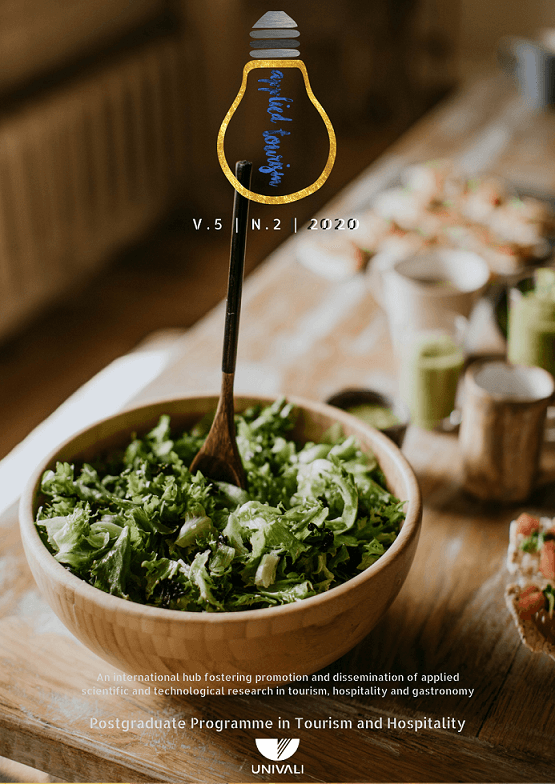

Food, with its different flavors, is introduced into a child’s life by the family and through nutritional education. Recreational activities also give children the ability to understand what to eat, and how to eat it. Due to the high demand for tourist accommodation that focuses on the family segment, the tourist trade, particularly hotel business, is hiring more employees in the recreation and leisure sector, in order to assist children and parents who want to enjoy a few hours of carefree leisure and rest. This article aims to show that recreational activities that provide nutritional education can be developed by hotel businesses as a form of children’s entertainment, stimulating creativity, teamwork, imagination, interpersonal relationships, the comfort of parents, along with an improvement in dietary habits. This study involves applied, exploratory, descriptive and bibliographic research, with a quantitative analysis to evaluate the level of children's satisfaction, using a visual 3-point Likert Scale. As an action strategy, we organized lectures with fun activities. We conclude that activities associated with nutritional learning are accepted by children as a means of socialization and entertainment, making them tools for use in accommodation establishments, as a recreational activity aimed at encouraging healthy eating.




ANDRADE, M. M. (2010). Introdução à metodologia do trabalho científico: elaboração de trabalhos na graduação. 10. ed - São Paulo: Atlas.
ASSOCIAÇÃO BRASILEIRA DE EMPRESAS DE EVENTOS; Sebrae Nacional. (2014). II Dimensionamento Econômico da Indústria de Eventos no Brasil. São Paulo: Eventos Expo. 2.ed. Available at: < http://www.abeoc.org.br/wp-content/uploads/2014/10/II-dimensionamento-setor-eventos-abeoc-sebrae-171014.pdf>. Acessed on: 20 Mar.2018.
ASSOCIAÇÃO BRASILEIRA DE NORMAS TÉCNICA. (2012). ABNT NBR 20121/2012: Sistemas de Gestão para a Sustentabilidade em Eventos. Available at: <http://www.abnt.org.br/imprensa/releases/5303-normalizacao-na-gestao-de-eventos>. Acessed on: 26 Aug. 2018.
BARBOSA, A. C. (2009). Princípios do desenvolvimento sustentável na gestão de eventos. In: Anais do XXXII Congresso Brasileiro de Ciências da Comunicação. Curitiba. Available at: <http://www.intercom.org.br/papers/nacionais/2009/resumos/R4-3751-1.pdf>. Acessed on: 01 July, 2018.
BRASIL. (2018). Plano de turismo. 2018-2022. Ministério do Turismo: Brasília, 2017.
DEUS, R. M.; SELLES, B.M.R.P.; VIEIRA, K.R.O. (2014). As organizações e a ISO 26000: revisão dos conceitos, dos motivadores das barreiras de implementação. Gest. Prod., São Carlos, v.21, n.4, p.793-809.
FERREIRA, A.B.H. Dicionário Aurélio Online de Português. (2018). Available at: < https://dicionariodoaurelio.com/ >. Acessed on: 23 May. 2018.
GIL, A.C. (2012). Métodos e técnicas de pesquisa social. 6. ed. São Paulo: Atlas.
IAQUINTO. B.O. A sustentabilidade e suas dimensões. (2018). Revista da ESMESC, v.25, n.31, p. 157-178. Available at: <https://revista.esmesc.org.br/re/article/view/187 >. Accessed on: 07 Sept. 2018.
INTERNATIONAL CONGRESS AND CONVENTION ASSOCIATION - ICCA. (2018). 2; ICCA Statistics Report Country & City Rankings. Available at: < https://www.iccaworld.org/newsarchives/archivedetails.cfm?id=1100291 >. Accessed on: 15 Apr. 2018.
INSTITUTO FEDERAL DE BRASÍLIA – IFB. (2017). Projeto Pedagógico do Curso Superior de Tecnologia em Eventos. Perfil do Egresso. Available at: < https://www.ifb.edu.br/attachments/article/18950/PPC%20Tecn%C3%B3logo%20em%20Eventos%202017.pdf >. Accessed on: 01 July, 2019.
INSTITUTO LIXO ZERO BRASIL. (2018). Certificação Lixo Zero. Available at: < http://ilzb.org/certificacao-lixo-zero/ >. Accessed on: 01 July, 2019.
INTERNATIONAL ORGANIZATION FOR STANDARDIZATION - ISO. (2012). Sustainable events with ISO 20121:2012.
JONES, M. (2018). Sustainable Event Management – A Practical Guide. 3.ed. Nova York.
JUNIOR, A. C. C; EDUARDO, F. S.; GHIRALDELLO, L. (2014). Estudo de mercado de eventos e eventos turísticos no município de Poços de Caldas/MG. Revista Gestão e Conhecimento, Poços de Caldas-MG, v.1, n.1 jan-dez.
LAKATOS, E. Maria; MARCONI, M. de Andrade. (2003). Fundamentos de metodologia científica: Técnicas de pesquisa. 5.ed. – São Paulo: Atlas.
LEME, P.C.S. e MORTEAN, A.F. (2010). Guia prático para organização de eventos mais sustentáveis: campus USP de São Carlos. São Carlos: EESC-USP. Available at: <http://www.ifsc.usp.br/~qualidade/qualidadewp/arquivos/guia_eventos_sustentaveis.pdf > . Accessed on: 07 Sept. 2018.
PEREIRA, E. S. (2010). Isso não tem importância: eventos e sustentabilidade na sociedade do espetáculo. Comunicare v. 10, n. 1. Centro Interdisciplinar de Pesquisa. Faculdade Cásper Libero. São Paulo, v. 10, n. 1, p. 91-107. São Paulo/SP.
PRODANOV, C. C.; FREITAS, E.C. (2013). Metodologia do trabalho científico [recurso eletrônico]: métodos e técnicas da pesquisa e do trabalho acadêmico. – 2. ed. – Novo Hamburgo: Feevale.
PUGAS, L.S. (2017). Dimensões da sustentabilidade presentes no Festival Picnik em Brasília/DF. 2017. 83 f., il. Trabalho de conclusão de curso (Bacharelado em Turismo) —Universidade de Brasília, Brasília. Available at: < https://bdm.unb.br/bitstream/10483/18143/1/2017_LayaraDaSilvaPugas_tcc.pdf >. Accessed on: 12 Oct. 2018.
RAMPAZZO, L. (2015). Metodologia científica: para aluno do curso de graduação e pós-graduação. 8 ed. - São Paulo: Edições Loyola.
RICHARDSON, R.J. (2014). Pesquisa Social: métodos e técnicas. 3 ed. - 15. reedit. São Paulo: Atlas.
SANTOS, R.A; CHEHADE, M.B; ROCHA, G.C.G. (2010). A Importância da Compreensão do Conceito de Eventos à Execução do Planejamento, Perante as Etapas Pré, Durante e Pós Evento. Revista Científica Eletrônica de Turismo – ISSN: 1806-9169. Ano VII, número 12. Janeiro de 2010 – Periódicos Semestral. São Paulo.
SECRETARIA DE ESTADO DE ESPORTE, TURISMO E LAZER DO DISTRITO FEDERAL. (2018). Observatório do Turismo – Eventos. Available at: < http://www.observatorioturismo.df.gov.br/index.php/eventos/>. Accessed on: 04 July, 2018.
SICHE, R; AGOSTINHO, F; ORTEGA, E; ROMEIRO, A. (2007) Índices Versus Indicadores: precisões conceituais na discussão da sustentabilidade de países. Ambient. soc. [online]. 2007, vol.10, n.2, pp.137-148. ISSN 1414-753X.
TRIGO, A.G.M; SENNA, J.S.M. (2016). Sustentabilidade Em Eventos: características, motivações e análise de eventos sustentáveis. In: XII Congresso Nacional de Excelência em Gestão & III Inovarse – Responsabilidade Social Aplicada, n12. Rio de Janeiro. ISSN 1984-9354.
YOLLES, M.; FINK, G. (2014). The Sustainability of Sustainability. Business Systems Review, v. 3, n. 2, p. 1-32.




Derechos de autor 2024 Priscila Fernandes Carvalho de Melo, Edilaine da Silva Mota, Patrícia Pinheiro Fernandes Vieira
Esta obra está bajo una licencia internacional Creative Commons Atribución-CompartirIgual 4.0.






Uma plataforma internacional com a finalidade de promover e disseminar a pesquisa científica e tecnológica aplicada em turismo, hospitalidade e gastronomia.

